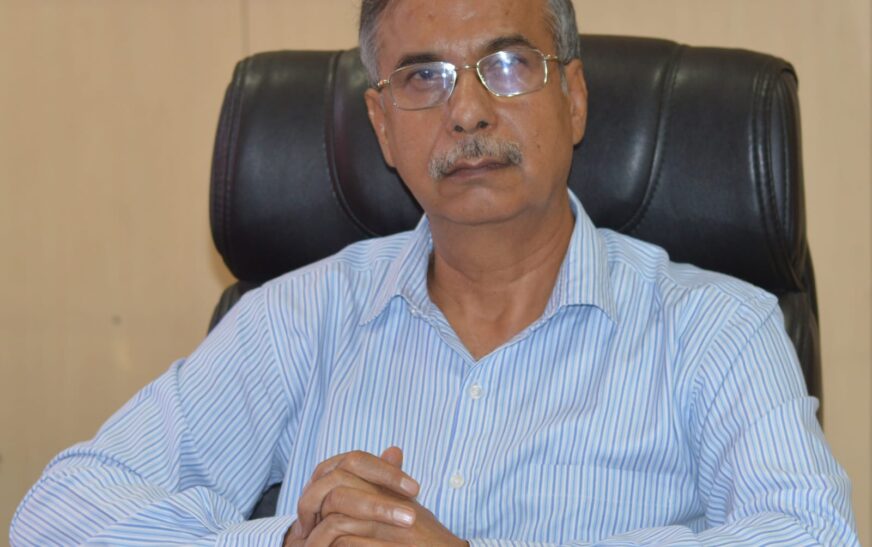“The Turmeric Latte” is a recent book that delves into the life of former top bureaucrat M. Damodaran. Compiled by Dr. Dinesh Tyagi, a retired bureaucrat and former MD, CSC eGovernance Services India Ltd., the book encapsulates the experiences, leadership, anecdotes, and stories shared by Damodaran’s former colleagues. This compilation serves as a tribute to Damodaran, highlighting his exceptional leadership qualities.
The book’s introduction poses a compelling question: Are there truly exemplary leaders within civil services who serve as models for others? “The Turmeric Latte” aims to answer this question by showcasing one such leader, M. Damodaran. A member of the 1971 batch of the Indian Administrative Service (IAS), Damodaran served in various capacities within both the State Government of Tripura and the Central Government. His impact was profound, leaving an indelible mark on every institution he worked in.
Damodaran’s leadership prowess shines through in instances like his stewardship of Indian Bank as CMD during its tumultuous period, and his pivotal role in restructuring UTI amidst stock market scandals. Throughout his career, he earned the admiration of many colleagues who regarded him as a role model.
In a candid conversation with Sandeep Joshi representing The Interview World, Dr. Dinesh Tyagi sheds light on the process behind curating “The Turmeric Latte”. Recently launched in Delhi, this book offers invaluable insights into Damodaran’s life and leadership journey. Here, we delve into the key takeaways from Dr. Tyagi’s interview.
Q: What influenced you to curate this particular book?
A: Despite the sincere efforts exerted by many civil servants, the esteem for civil services officers within the general public remains relatively low. This raises the question: Are there exemplary leaders among them? Our quest led us to seek out an individual who embodies unique leadership qualities, serving as a beacon for civil servants to emulate. We aimed to uncover these qualities through the accounts of those who have had the privilege of working alongside him throughout his career in civil services, and even after his retirement.
M. Damodaran emerges as a figure of remarkable distinction, renowned for his exceptional leadership skills. His stewardship has been pivotal in navigating numerous institutions through crises, including Indian Bank, UTI, IDBI, and Indigo Airlines. Beyond his accomplishments within the corporate realm, he is widely acknowledged as one of India’s foremost champions of corporate governance. Presently, Damodaran serves as an independent consultant and corporate advisor, guiding several prestigious companies. Furthermore, he dedicates his time to mentorship and sits on the boards of several esteemed organizations. Notably, he holds the distinction of being the Founder Chairman of IIM Tiruchirappalli.
Throughout his illustrious career, Damodaran has held influential positions such as Chief Secretary of Tripura and Joint Secretary in the Ministry of Finance, where he played a pivotal role in managing the government’s interactions with Public Sector Banks and RBI. His leadership acumen was further showcased during his tenure as Chairman, where he spearheaded the revival of UTI, India’s largest investment institution, and successfully restructured and merged IDBI with another commercial bank.
Moreover, his tenure as Chairman of SEBI marked a transformative period for India’s securities market, characterized by the introduction of improved practices and regulatory measures. Upon reaching out to officers from various institutions, including those in the IAS who had the privilege of working closely with him, it became evident that Damodaran’s leadership left an indelible mark. Each individual expressed a desire to share anecdotes, incidents, and unique qualities attributed to him, even long after their association had ended.
The overwhelming response prompted us to embark on a project to collate these experiences into a book, envisaging it as a valuable resource to guide future civil servants and corporate leaders alike. Through the wisdom imparted by Damodaran’s exemplary leadership journey, we aspire to inspire and empower generations to come.
Q: What personal qualities and professional attributes characterize M. Damodaran, both in his capacity as a human being and as a bureaucrat?
A: M. Damodaran stands out among his peers for his exceptional leadership qualities and unwavering dedication to his role. Colleagues unanimously praise his outstanding communication skills, describing him as a compelling and articulate communicator. His ability to motivate others is unparalleled, inspiring his team to achieve their highest potential. As an institution builder, he has a profound faith in the capabilities of his colleagues, fostering an environment of trust and empowerment. Notably, he demonstrates genuine empathy and concern for citizens, particularly those who are marginalized or deprived.
Furthermore, Damodaran’s leadership style is characterized by his willingness to support his subordinates, encouraging them to undertake legitimate risks that serve the greater good of the institution. He eagerly embraces challenges and thrives in high-pressure situations. Integrity is at the core of his ethos, and he ensures that his team adheres to the highest ethical standards without compromise. With a relentless pursuit of excellence, he pushes his team to strive for innovation, sincerity, and unwavering commitment, creating a culture of continuous improvement and growth.
Q: What are the discernible changes in the functioning of Indian bureaucracy from the time you served until now, and how has this administrative system evolved over the years?
A: In the past, the bureaucracy was driven by a strong sense of duty to serve society, especially the vulnerable and overlooked. Now, it has transformed alongside technological advancements, adopting a corporate approach to managing public affairs. While some changes are necessary to address evolving societal challenges, maintaining neutrality remains a cornerstone of bureaucratic strength.
However, there’s a concerning trend among some civil servants to excessively align themselves with the political executive, which needs to be addressed. Today’s bureaucracy is more visible thanks to social media, a stark contrast to its earlier existence in relative obscurity, relying solely on its actions to garner public appreciation.
Additionally, there appears to be a decline in the ability of senior civil servants to effectively mentor and shape the next generation of leaders. This shift underscores the need for revitalizing leadership development within the bureaucracy.
Q: What strategies and reforms are necessary to effectively cultivate and prepare future bureaucrats for the evolving challenges of governance?
A: Enhancing training and skill development is imperative to better cater to the needs and expectations of the general populace. The objective is to ensure that every citizen can access government services conveniently from their residences through technological interfaces. While considerable strides have been taken in this direction, further refinement is necessary. The pivotal moment will be reached when citizens seamlessly receive services without the inconvenience of physically visiting a government office.
Moreover, this milestone represents the true essence of civil service, where efficiency and accessibility intersect to serve the public interest effectively. Such a transformation has the potential to significantly alter citizen perceptions, fostering a collaborative and supportive relationship between the government and its constituents. By embracing technological advancements and refining service delivery mechanisms, the government can better fulfill its role as a facilitator and provider of essential services, ultimately enhancing the overall quality of life for its citizens.
Q: What specific administrative reforms would address the current challenges and enhance efficiency in India?
A: The current hierarchical arrangement of civil service, spanning from Class A to D, mirrors societal hierarchies and thus requires restructuring. This restructuring should entail a more adaptable framework, with hierarchical norms revised and stricter criteria to eliminate inefficiencies and dishonest practices.
To enhance civil service effectiveness, all civil servants must undergo attachments with the Armed Forces at defined intervals. This experience would enrich their skill set and foster a deeper understanding of national defense and security concerns. Additionally, there should be an option for civil servants who prefer field postings over administrative roles in the secretariat. These field operatives could serve for extended periods, approximately 20-25 years, enabling them to specialize in project implementation and scheme execution, thus enhancing efficiency and expertise at the grassroots level.










3 Comments
A very well curated work highlighting great qualities of a well respected human being.
Such a nice work and good work to explain about him for all .
This web page can be a walk-via for the entire data you wished about this and didn’t know who to ask. Glimpse here, and also you’ll undoubtedly uncover it.
Comments are closed.